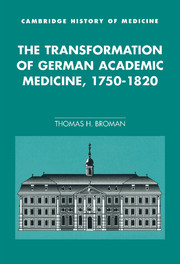Book contents
- Frontmatter
- Contents
- Acknowledgments
- Introduction
- 1 Physicians in eighteenth-century Germany
- 2 Fractures and new alignments
- 3 Physicians and writers: Medical theory and the emergence of the public sphere
- 4 The art of healing
- 5 Breaking the shackles of history: The Brunonian revolution in Germany
- 6 German academic medicine during the reform era
- Conclusion: Disciplines, professions, and the public sphere
- Index
- Cambridge History of Medicine
5 - Breaking the shackles of history: The Brunonian revolution in Germany
Published online by Cambridge University Press: 30 September 2009
- Frontmatter
- Contents
- Acknowledgments
- Introduction
- 1 Physicians in eighteenth-century Germany
- 2 Fractures and new alignments
- 3 Physicians and writers: Medical theory and the emergence of the public sphere
- 4 The art of healing
- 5 Breaking the shackles of history: The Brunonian revolution in Germany
- 6 German academic medicine during the reform era
- Conclusion: Disciplines, professions, and the public sphere
- Index
- Cambridge History of Medicine
Summary
For all the real disagreements – especially regarding medical education – that existed between the Naturphilosophen and those who believed medicine to be a vocation to healing, in a curious way the two groups could tolerate each other fairly well. That is because both implicitly accepted a degree of separation between theory and practice. For their part, the Naturphilosophen were not especially interested in designing their theories to provide useful guides to practice. Even a theorist who did seek to close such links, such as Johann Christian Reil, contented himself with alluding only in the most general way to the therapeutic implications of the system described in “Von der Lebenskraft”, recognizing that a real unification of theory and practice lay somewhere in the future. Until such a time should arrive, Reil readily accepted the “empirical” methods of practice advocated by Hecker and Gruner. On the other side, Christoph Wilhelm Hufeland too claimed on occasion to see a future when medical practice would become an applied science, although he held deep misgivings over its desirability. Hufeland's image of that future therefore tended to be far more remote than Reil's. These doubts about a unified science of medicine did not prevent Hufeland from attributing some value to theory, and he proclaimed medical theories welcome for their service in broadening physicians’ perspectives on the phenomena of disease.
Although neither of these groups chose the most radical of the possibilities offered in the 1790s, other physicians did.
- Type
- Chapter
- Information
- The Transformation of German Academic Medicine, 1750–1820 , pp. 128 - 158Publisher: Cambridge University PressPrint publication year: 1996

